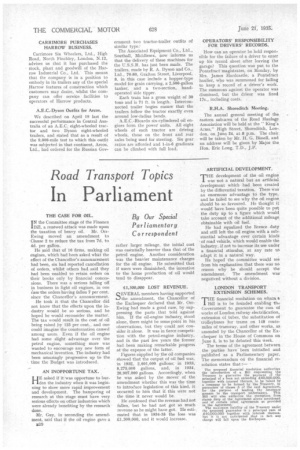Road Transport Topics
Page 34

If you've noticed an error in this article please click here to report it so we can fix it.
In Parliament
By Our Special Parliamentary Co r respondent
THE CASE FOR OIL.
IN the Committee stage of the Finance Bill, a renewed attack was made upon the taxation of heavy oil. Mr. OrrEwing moved an amendment to Clause 2 to reduce the tax from 7d. to 4d. per gallon.
He said that of 16 firms, making oil engines, which had been asked what the effect of the Chancellor's announcement had been, six had reported cancellation of orders, whilst others had said they had been enabled to retain orders on their books only by financial concessions. There was a serious falling off in business in light oil engines, in one Case the orders having fallen 7 per ceht, since the Chancellor's announcement.
He took it that the Chancellor did not know that the effects upon the industrv would be so serious, and he hoped he would reconsider the matter. The tax would result in the cost of oil being raised by 125 per cent., and one could imagine the consternation caused among users. Even if the oil engine had some slight advantage over the petrol engine, something more was wanted to encourage any new form of mechanical invention. The industry had been amazingly progressive up to the time the Budget was introduced.
AN INOPPORTUNE TAX.
HE asked if it was opportune to burden the industry when it was beginning to show more rapid improvement and development. The hampering of research at this stage must have very serious effects on other industries which were already benefiting by the research done.
• Mr. Guy, in seconding the amend
ment, said that if the oil engine gave a je,20,
rather larger mileage, the initial cost was essentially heavier than that of the petrol engine. Another consideration was the heavier maintenance charges for the oil engine. He submitted that if users were diminished, the incentive to the home production of oil would tend to disappear.
£1,300,000 LOST REVENUE.
CEVERAL members having supported
the amendment, the Chancellor of the Exchequer declared that Mr. OrrEwing had made a good case, by suppressing the parts that told against him. If the oil-engine industry stood alone, there might be some point in his observations, but they could not consider it alone. It was in fierce competition with the petrol-engine industry, and in the past few years the former had been making remarkable progress at the expense of the latter.
Figures supplied by the oil companies showed that the output of oil fuel was, in 1932, 2,601,000 gallons; in 1933, 8,275,000 gallons, and, in 1934, 20,907,000 gallons. Accordingly, when he was asked by the mover of the amendment whether this was the time to introduce legislation of this kind, it occurred to him that if this were not the time it never would be.
He confessed that the revenue had not fallen, but he had not got so much revenue as he might have got. He esti-, mated that in 1934-35 the loss was £1,300,000, and it would increase
ARTIFICIAL DEVELOPMENT.
THE development of the oil engine was not a natural but an artificial. development which had been created by the differential taxation. There was' an enormous advantage to the type, and he failed to see why the oil engine should be so favoured. He thought it would have been quite possible to put the duty up to a figure which would, take account of the additional mileage. obtainable with oil fuel.
He had equalized the licence duty and still left the oil engine with a sub stantial advantage over certain kind§ of road vehicle, which would enable the industry, if not to increase its use under a financial stimulus, at any rate to adapt it in a natural way.
He hoped the committee would see from his explanation that there was no reason why he should accept the amendment. The amendment was negatived without a division.
LONDON TRANSPORT EXTENSION SCHEMES.
THE financial resolution on whnsss,a Bill is to be founded enabling the Government to guarantee the cost of works of London railway electrification, extension of tubes, the substitution of trolleybuses for trams on 148 routemiles of tramway, and other works, as amended by the Chancellor of the Exchequer in the House of Commons on June 5, is to be debated this week.
The terms of the agreement between. the parties have been initialled and published as a Parliamentary paper. The memorandum on the financial resolution states that :—
The proposed financial resolution authorizes the introduction of a Bill empowering the Treasury to guarantee the payment of the principal of a loan not exceeding £40,000,000, together with interest thereon, to be raised by a company to be formed by the Treasury, in pursuance of clause 3 of the said Agreement, for the purpose of lending the necessary moneys to the transport undertakers. This Bill wilt also authorize the exemption from stamp duty of the Agreement above mentioned and of certain other. agreements as provided in the Agreement. The maximuip liability of the Treasury under the proposed guarantee is a principal sum of £40,000030 together with interest thereon. i
but it s not anticipated that in fact any charge will fall upon the Exchequer.




























































































